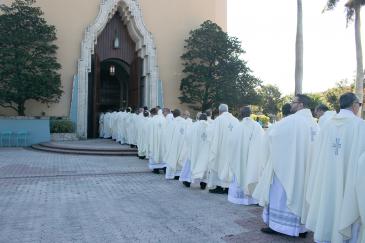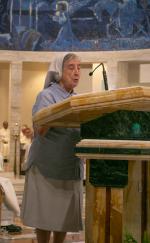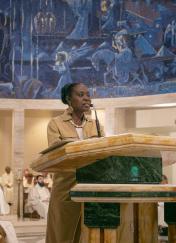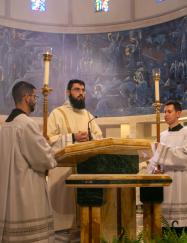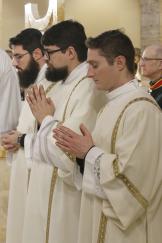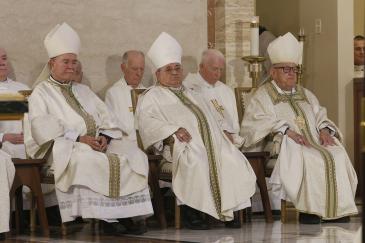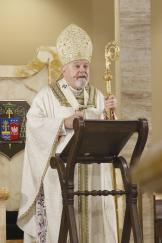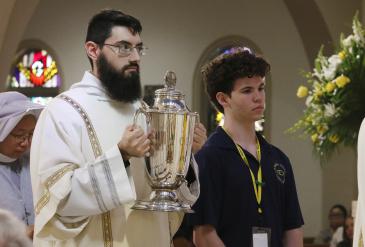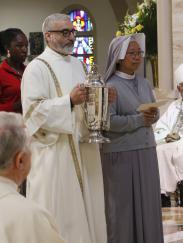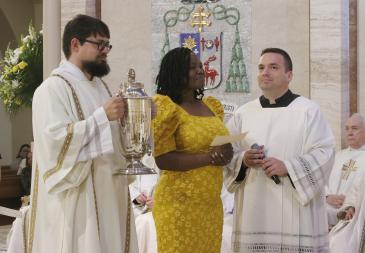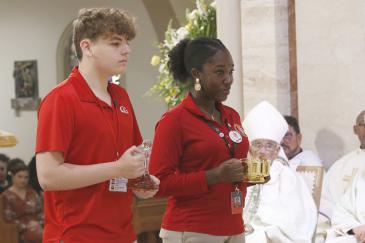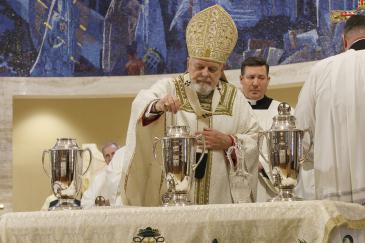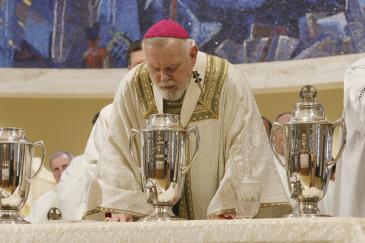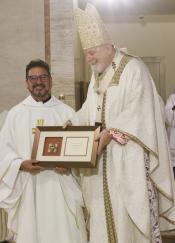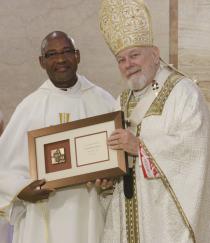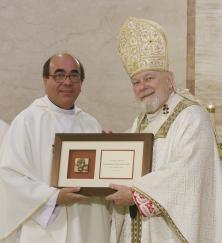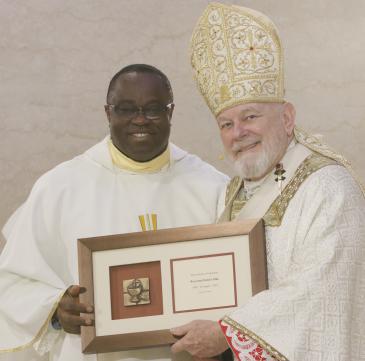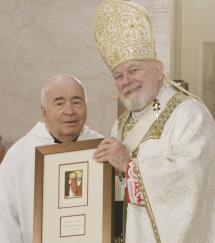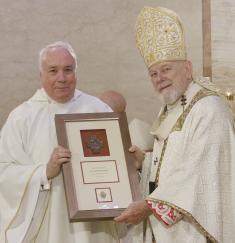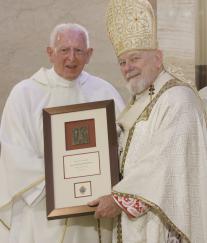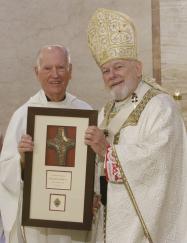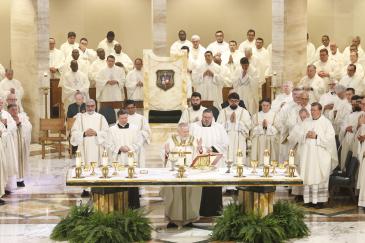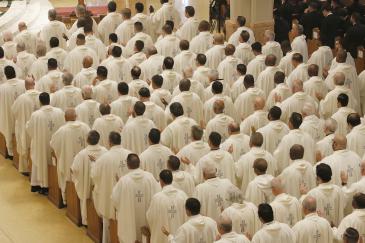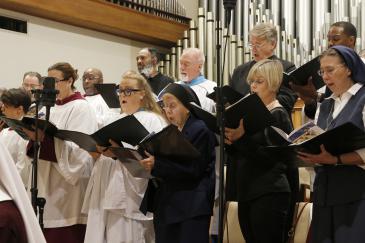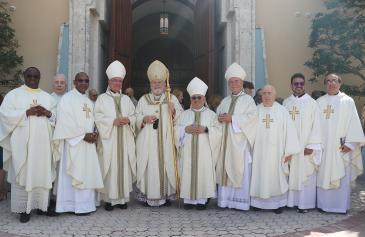By Archbishop Thomas Wenski - The Archdiocese of Miami
Photography: CRISTINA CABRERA JARRO | FC
Archbishop Thomas Wenski preached this homily at the annual chrism Mass where priests renew their ordination promises and the Holy Oils — used in parishes for the sacraments — are blessed and consecrated. The Mass was celebrated March 26, 2024, the Tuesday of Holy Week, at St. Mary Cathedral.
This Chrism Mass has us blessing the oils used at the various stages of our Christian lives: the oil of catechumens, the oil of the sick, and the sacred Chrism used at baptisms, confirmation, and the ordinations of priests and bishops. This Mass also affords us the opportunity to thank all our priests for their witness and their service but especially those celebrating the 25th, 50th, and even 60th jubilees of their ordinations. A priest offers the Holy Sacrifice every day and therefore sacrifice is the condition of their lives. That sacrifice is expressed through their chaste celibacy, through their detachment from material comforts, and through their obedience to their bishop.
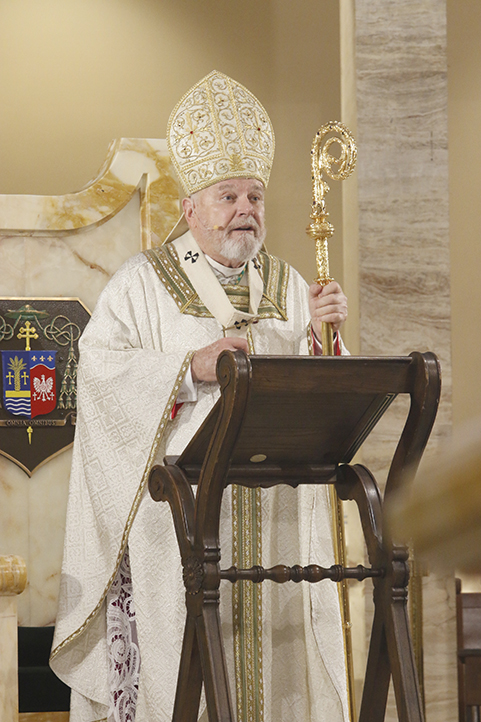
Photographer: CRISTINA CABRERA | FC
Archbishop Thomas Wenski preaches his homily from the "cathedra" or bishop's chair from which the word "cathedral" is derived. The chrism Mass was celebrated March 26, 2024 at St. Mary Cathedral.
Today, all of us priests with gratitude for our vocation and with humility for all our shortcomings will renew our “yes” to the Lord’s call. We make this renewal of our “yes” before God but also before all of you. Pray for us that we will be the priests of God you, the people of God, need and deserve. We make this renewal of our “yes” before the seminarians of our Archdiocese – there are almost 60 of them. Included are four deacons who -God willing will be ordained priests in May. Pray for them as well as they discern God’s call.
The word “Christian” simply means “anointed one” – our anointing means that we belong to Christ. But, as St. Ignatius of Antioch once said, “It is not enough to be called Christians, we must be Christians.
Hopefully, the prayers and practices of our Lenten observances have helped us to be better Christians.
“The Spirit of the Lord God is upon me because the Lord has anointed me”. May that Holy Spirit be newly effective in all of us so that we will be joyful witnesses of the good news, “to bring glad tidings to the lowly, to heal the brokenhearted, to proclaim liberty to the captives... to comfort all who mourn...”
We live in a world of fragile peace and broken promises, a world desperately in need of “glad tidings”. Our societies are increasingly polarized, our institutions discredited, and our families fractured. The ongoing war of attrition in Ukraine and the violence of the Israeli-Hamas conflict cause great anxiety, as do situations closer to home. I often remind people that here in Miami we are surrounded by “islands” of pain: Haiti, Cuba, Venezuela, and Nicaragua. Almost everyone in South Florida has a personal connection with someone in one or more of those countries.
As the Good Samaritan poured oil into wounds of the one who had fallen among robbers to heal him, the holy oils are given to us to heal the wounds of our sins, and we are strengthened by the Spirit’s anointing with “the oil of gladness” we might in turn heal the brokenhearted. The inn where the Good Samaritan brought the man who had fallen among robbers represents the Church who ministers the balm of healing through the Sacraments.
For 65 years, this local Church has been that inn for successive waves of newcomers – from Cuba, Haiti, Nicaragua, Venezuela, Colombia – all of South and Central America and the Caribbean as well as those newcomers from northern climes. As a Church and as a presbyterate, our diversity has not divided us but has enriched us. We have learned that the newcomer represents not a threat but an opportunity. But importantly, the newcomer – perhaps, a strange – is still a brother or sister to be embraced as such.
In the last 15 months, I would hazard to guess that our population here in South Florida has grown by at least 250,000 people, many if not most of them brokenhearted and wounded by poverty, political repression, and ideological indoctrination. Many face uncertain futures because of a lack of legal status. Family separation, violence, and even rape have left deep wounds on their psyches, and their needs to feed and house themselves cause daily anxieties.
The ongoing tragedy of Haiti weighs heavy on my heart and, I am sure, on yours as well. But so does that of Cuba, Venezuela, and Nicaragua. As a Church, we certainly have something to say to our fellow Americans – and to our political leaders, especially those that would depict those fleeing intolerable situations as something like an “invasive species”. No, they are our brothers and sisters. And while the crisis at our borders needs to be solved and a broken system that encourages illegal or irregular migration needs to be fixed, we don’t solve anything, or fix anything, by sending people back into a “burning building”.
Yes, as a Church, we have something to say. But we also have something to do.
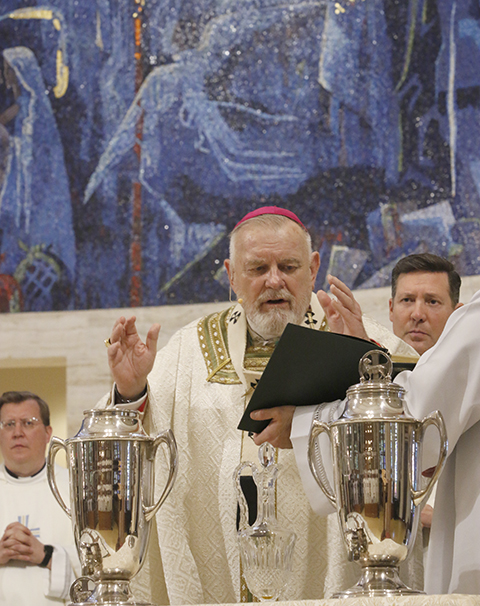
Photographer: CRISTINA CABRERA | FC
Archbishop Thomas Wenski blesses the oil of catechumens of the sick and of chrism during the chrism Mass celebrated at St. Mary Cathedral, March 24, 2024.
I remember years ago speaking with Msgr. Bryan Walsh, the “hero” of Operation Pedro Pan, that brought some 14,000 children, unaccompanied minors, to the U.S. He observed that the first five years after a migrant’s arrival are the most crucial. In those first five years, you have to learn the language (or at least try to), you have to find a place to live and a job for your livelihood, you need to try to straighten out your immigration status (if at all possible) and try to reunite with family left behind. All this happens in the first five years. And, Msgr. Walsh said if the Church is not there to accompany the migrant in those first five years, to heal them, to comfort them, “to give them the oil of gladness in place of mourning, a glorious mantle instead of a listless spirit”, ... If the Church is not there – not with them then – then why would they need the Church in the next five years?
With 250,000 newcomers in the past year alone, we cannot allow ourselves to be complacent, with Lazarus on our doorsteps, we cannot refuse to see him and do nothing. My brother priests, members of Christ’s faithful: be there for them, walk with them, accompany them, welcome them, heal, and comfort them!
Today’s first reading was taken from the Prophet Isaiah. Isaiah is the great prophet of the Messiah. In today's passage, Isaiah speaks of the servant who is anointed the Messiah — the Christ — by the Spirit. He goes on to describe Christ's mission to announce glad tidings — the Joy of the Gospel — to the poor, restore sight to the blind, to free the captive and the oppressed, to declare a Jubilee.
It was this text that Jesus chose for his first sermon. It is the interpretive key to understanding all that would follow in the Gospel. It is as though Isaiah has written a job description for Jesus and for each one of us “Christened” people.
My brother priests, in carrying out your ministry, bear in mind that, as you share the one bread with your brothers and sisters, you form one body with them. Show a sincere love for Christ's Mystical Body, God's holy people, and especially for the weak and the sick. Bear with people’s faults patiently — be a reconciled and reconciling presence in the communities in which you serve. Be obedient to the commandment which the Lord gave to his apostles at the Last Supper: "Love one another as I also have loved you.”
“The Spirit of the Lord is upon us...”
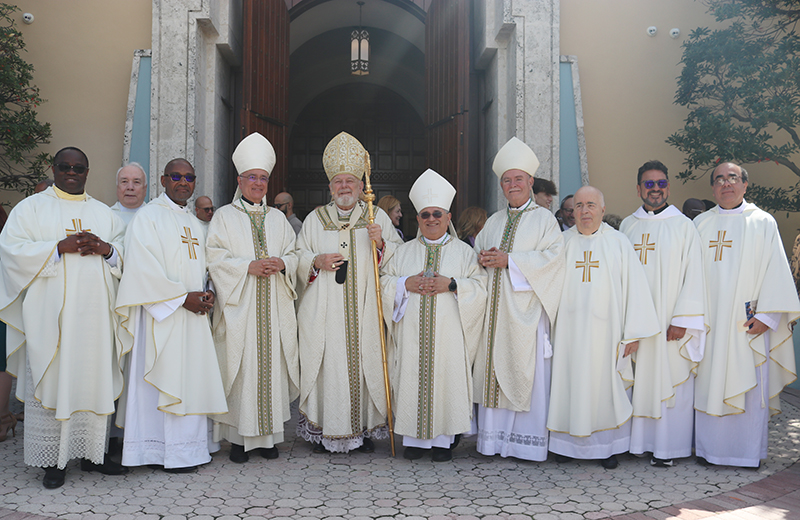
Photographer: ROCIO GRANADOS | LVC
Archbishop Thomas Wenski, three bishops, and eight priests honored during the annual chrism Mass at St. Mary Cathedral, March 26, 2024, pose for a photo after the Mass; from left: Father Fidelis Uko, chaplain at Baptist Health's South Miami Hospital; Father Robert Bouffier, chaplain at Chaminade Madonna College Prep. in Hollywood; Father Robés Charles, pastor of Sacred Heart in Homestead; Bishop Silvio Baez, auxiliary of Managua, Nicaragua, currently living in exile in South Florida; Archbishop Thomas Wenski, who presided at the Mass; Miami Auxiliary Bishop Enrique Delgado; Bishop Fernando Isern, retired bishop of Pueblo, Colorado; Father Eduardo Alvarez, who recently retired as pastor of Gesu; Father Jaime Acevedo, pastor of St. Mark Church in Southwest Ranches; Father Juan de Dios Garcia Cortez, currently serving at Good Shepherd in Miami.

